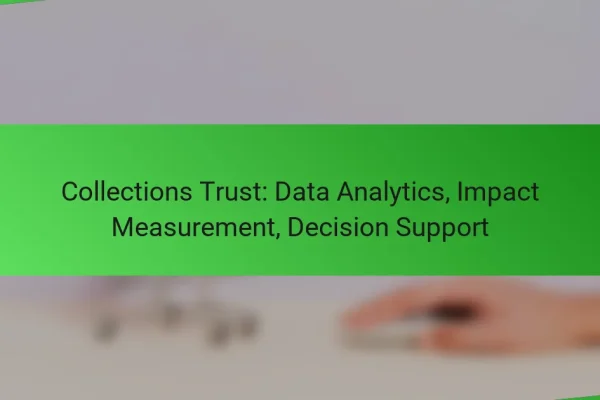How can technology improve collections trust in the UK?
Technology can significantly enhance collections trust in the UK by increasing transparency, improving fraud detection, and providing valuable insights through data analytics. These advancements help build confidence among stakeholders by ensuring accountability and reliability in collections processes.
Blockchain for transparency
Blockchain technology offers a decentralized and immutable ledger that can enhance transparency in collections. By recording transactions in a secure manner, all parties can verify the authenticity and provenance of items, reducing the risk of disputes.
For example, art collections can utilize blockchain to document ownership history, ensuring that buyers can trace the legitimacy of a piece. This level of transparency can foster trust among collectors, galleries, and investors alike.
AI for fraud detection
Artificial intelligence (AI) can play a crucial role in detecting fraudulent activities in collections. By analyzing patterns and anomalies in transaction data, AI systems can flag suspicious behavior that may indicate fraud.
For instance, AI algorithms can assess the authenticity of artworks by comparing them against known databases of verified pieces. This proactive approach helps protect collectors and institutions from potential losses due to counterfeit items.
Data analytics for insights
Data analytics enables organizations to gain insights into collection trends, market demands, and valuation changes. By leveraging large datasets, stakeholders can make informed decisions regarding acquisitions, sales, and pricing strategies.
For example, analytics can reveal which types of items are appreciating in value, guiding collectors on where to invest. Additionally, understanding buyer behavior can help galleries tailor their offerings to meet market needs, ultimately enhancing trust in their collections.
What technologies are enhancing collections trust?
Several technologies are significantly improving collections trust by ensuring secure transactions and reliable identity verification. These advancements foster confidence among users and businesses alike, making it easier to engage in financial exchanges.
Digital identity verification
Digital identity verification involves using technology to confirm a person’s identity online. This process typically includes methods like biometric scans, two-factor authentication, and document verification. By implementing these techniques, businesses can reduce fraud and ensure that only legitimate users access their services.
For example, many financial institutions now require customers to submit a government-issued ID along with a selfie for verification. This method not only enhances security but also streamlines the onboarding process, making it faster and more efficient.
Secure payment gateways
Secure payment gateways facilitate safe online transactions by encrypting sensitive data during the payment process. These systems protect customer information, such as credit card numbers and personal details, from potential breaches. Choosing a reliable payment gateway is crucial for businesses looking to build trust with their customers.
Popular options like PayPal, Stripe, and Square offer robust security features, including fraud detection and compliance with PCI DSS standards. Businesses should evaluate these gateways based on transaction fees, ease of integration, and user experience to ensure they meet their needs.
Smart contracts
Smart contracts are self-executing agreements with the terms directly written into code. They operate on blockchain technology, which ensures transparency and immutability. By automating contract execution, smart contracts reduce the need for intermediaries, thereby decreasing costs and enhancing trust between parties.
For instance, in real estate transactions, smart contracts can automatically transfer ownership once payment is confirmed, minimizing the risk of fraud. Businesses considering smart contracts should assess the technical requirements and potential legal implications to ensure compliance with local regulations.
Why is collections trust important for businesses?
Collections trust is vital for businesses as it fosters confidence between companies and their clients, ensuring reliable transactions and long-term relationships. A strong collections trust can lead to improved cash flow, reduced disputes, and enhanced reputation in the market.
Reduces risk of fraud
Implementing technology to enhance collections trust significantly lowers the risk of fraud. Tools such as automated invoicing and secure payment gateways can help verify transactions and track payment histories, making it harder for fraudulent activities to occur.
For example, businesses can utilize two-factor authentication and encryption to protect sensitive financial data. Regular audits and monitoring of transactions can further identify any suspicious activities early on, allowing for prompt action.
Enhances customer relationships
Technology plays a crucial role in enhancing customer relationships through improved communication and transparency in collections processes. Automated reminders and clear payment terms can help customers stay informed, reducing misunderstandings and fostering trust.
Additionally, providing multiple payment options and flexible terms can cater to diverse customer needs, making it easier for them to fulfill their obligations. This approach not only strengthens the relationship but can also lead to increased customer loyalty and repeat business.
What are the challenges in implementing technology for collections trust?
Implementing technology for collections trust involves several challenges, primarily related to data privacy, system integration, and user acceptance. Organizations must navigate these hurdles to effectively enhance trust and transparency in their collections processes.
Data privacy concerns
Data privacy is a significant challenge when implementing technology for collections trust. Organizations must ensure that they comply with regulations such as the General Data Protection Regulation (GDPR) in Europe or the California Consumer Privacy Act (CCPA) in the United States. This involves safeguarding sensitive information and being transparent about data usage.
To address privacy concerns, organizations should adopt robust data encryption methods and conduct regular audits. Implementing clear privacy policies and providing users with control over their data can also help build trust.
Integration with existing systems
Integrating new technology with existing systems can be complex and resource-intensive. Organizations often face compatibility issues, which can lead to data silos and inefficiencies. A thorough assessment of current systems is essential before introducing new technology.
To facilitate smoother integration, organizations should consider using open APIs and modular solutions that allow for gradual implementation. Engaging IT professionals early in the process can help identify potential challenges and streamline the integration process.
How do UK regulations impact technology in collections?
UK regulations significantly influence how technology is utilized in collections, particularly in ensuring compliance and protecting consumer rights. Organizations must integrate these regulations into their technological frameworks to avoid penalties and enhance trust with clients.
GDPR compliance requirements
The General Data Protection Regulation (GDPR) mandates that organizations handling personal data implement stringent measures to protect that data. This includes obtaining explicit consent from individuals before collecting their information and ensuring data is stored securely.
To comply with GDPR, companies should conduct regular data audits, maintain clear records of consent, and have robust data protection policies in place. Failure to adhere can result in fines reaching up to 4% of annual global turnover or €20 million, whichever is higher.
Financial Conduct Authority guidelines
The Financial Conduct Authority (FCA) sets out specific guidelines for financial services firms, including those involved in collections. These guidelines emphasize treating customers fairly and ensuring transparency in communications and transactions.
Firms must implement technology that allows for clear record-keeping and effective customer communication. This includes using secure platforms for transactions and ensuring that customers can easily access their account information. Non-compliance can lead to regulatory action and damage to reputation.
What are best practices for using technology in collections?
Best practices for using technology in collections involve implementing systematic approaches that enhance efficiency, accuracy, and compliance. Organizations should focus on regular audits, employee training, and leveraging appropriate tools to optimize their collection processes.
Regular system audits
Conducting regular system audits is crucial for maintaining the integrity and effectiveness of collection technologies. These audits help identify any discrepancies, outdated software, or security vulnerabilities that could affect operations.
Organizations should schedule audits at least annually, but semi-annual reviews are recommended for high-volume environments. During these audits, assess data accuracy, compliance with regulations, and the performance of collection tools.
Employee training programs
Implementing comprehensive employee training programs ensures that staff are proficient in using collection technologies. Training should cover system functionalities, data entry protocols, and compliance requirements to minimize errors and enhance productivity.
Consider offering training sessions quarterly, along with refresher courses whenever new technology is introduced. Encourage staff to provide feedback on training effectiveness to continuously improve the program.
What emerging trends are shaping collections trust technology?
Emerging trends in collections trust technology focus on enhancing transparency, efficiency, and security. These advancements are driven by innovations such as artificial intelligence, blockchain, and data analytics, which collectively improve the management of collections and foster greater trust among stakeholders.
Increased use of AI
The increased use of artificial intelligence (AI) in collections trust technology is transforming how organizations manage their assets. AI algorithms can analyze vast amounts of data to identify patterns, predict trends, and automate repetitive tasks, thereby increasing efficiency and reducing human error.
For instance, AI can streamline the collections process by automating communication with debtors, predicting payment behaviors, and optimizing collection strategies. Organizations can leverage AI tools to enhance decision-making, leading to improved recovery rates and reduced operational costs.
When implementing AI, it is crucial to ensure data privacy and compliance with regulations. Organizations should regularly review their AI systems to mitigate biases and maintain transparency in their operations, fostering trust among clients and stakeholders.












